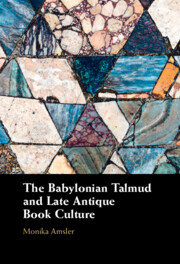The Babylonian Talmud and Late Antique Book Culture
In this book, Monika Amsler explores the historical contexts in which the Babylonian Talmud was formed in an effort to determine whether it was the result of oral transmission. Scholars have posited that the rulings and stories we find in the Talmud were passed on from one generation to the next, each generation adding their opinions and interpretations of a given subject. Yet such an oral formation process is unheard of in late antiquity. Moreover, the model exoticizes the Talmud and disregards the intellectual world of Sassanid Persia. Rather than taking the Talmud’s discursive structure as a sign for orality, Amsler interrogates the intellectual and material prerequisites of composers of such complex works, and their education and methods of large-scale data management. She also traces and highlights the marks that their working methods inevitably left in the text. Detailing how intellectual innovation was generated, Amsler’s book also sheds new light on the content of the Talmud. This title is also available as Open Access on Cambridge Core.
Monika Amsler is Postdoctoral Researcher in the Department of Ancient History at the University of Bern. A historian of ancient religion, she is the editor of Knowledge Construction in Late Antiquity, published in the Trends in Classics Supplementary Volume Series.

